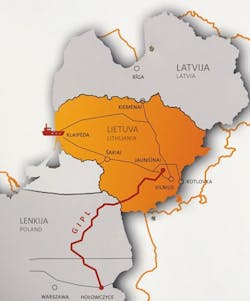Poland-Lithuania Interconnector gas pipeline commissioned
The bidirectional natural gas interconnection between Poland and Lithuania (GIPL) was formally commissioned last week, connecting the Baltic and Finnish markets with the Polish market. The project will increase the reach of both the 3.75-billion cu/m year (bcmy) Klaipėda LNG terminal in Lithuania and the 5-bcmy Świnoujście LNG terminal in Poland.
Flows through the pipeline began May 1, 2022, with capacity from Lithuania to Poland expected to reach 1.9 bcmy in the next 5 months and capacity from Poland to Lithuania to reach 2 bcmy.
“Today’s interconnection is another step in helping this region to be fully integrated into the internal European Union (EU) energy market,” the European Commission said, “diversifying away from Russian gas. This has become all the more important following Russia’s unilateral decision to disrupt gas supplies to Poland and the decision of the Baltic States not to import Russian gas. Further elements for reducing our dependence on Russian fossil fuels will follow with the REPOWER EU package before the end of May.”
Within the broader framework of the Baltic Energy Market Interconnection Plan, GIPL follows the completion of the 2.6-bcmy Balticconnector and the 2.5-bcmy Estonian-Latvian interconnector, which ensured integration of Finland into the internal gas market. Further projects will follow in the region, such as 10-bcmy Baltic Pipe (due to come online in October 2022), and the 4.7-bcmy Polish-Slovak interconnector to be finalized later this year, according to the EC. Moreover, expansion of the Latvian-Lithuanian interconnector to 6.5 bcmy, scheduled for 2023, and upgrade of the 4.5-bcm Inčukalns underground storage in Latvia expected in 2025, will further increase the region’s energy security. EU infrastructure plans in the Baltic region also include synchronization of the electricity networks of the Baltic States with the rest of the EU, strengthening the internal grid infrastructure, improving interconnections, and the integration of renewable energy in the region.
The Trans-European Networks for Energy (TEN-E) is a policy focused on linking energy infrastructure in all parts of the EU through projects of common interest (PCIs), based on nine priority corridors and three thematic areas. Examples of other projects include the 3-bcmy Greek-Bulgarian Interconnector, due to be completed before end-2022, and the floating storage and regasification unit for LNG at the northern Greek port of Alexandroupolis, where development was launched last week, and operations are expected to start in 2023 (OGJ Online, May 6, 2022).
Polish-state PGNiG Group also last week received its first LNG cargo at Klaipėda. The 150,000-cu m shipment arrived aboard the BP Shipping-chartered Aristidis 1 carrier from Freeport LNG in Freeport, Tex. Klaipėda has been operational since 2014.
About the Author
Christopher E. Smith
Editor in Chief
Chris joined Oil & Gas Journal in 2005 as Pipeline Editor, having already worked for more than a decade in a variety of oil and gas industry analysis and reporting roles. He became editor-in-chief in 2019 and head of content in 2025.

